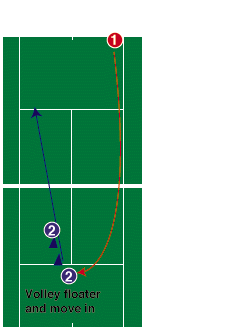By Monty Basnyat, TennisONE Associate Editor
How do you play high-bouncing mid-court balls?

This tactic is best used against players who are constantly floating balls back, particularly when they are returning one of your deep shots into the corner. The key is to recognize when your opponent is on the defensive and immediately move inside the baseline to anticipate the floater. By doing so, you can take the mid-court ball as a volley and then come in behind it. The basic idea here is to rob your opponent of recovery time while you establish a better volleying position.
From mid-court, you should generally hit an underspin volley. Hitting a swinging topspin volley, especially while on the move, is usually too risky. Remember, when you take the mid-court ball in the air, you will probably be outside the service box, so it's generally wiser to hit a safe volley and close in for the pass.
Of course there's always the exception. If you're playing with confidence and you have your own version of Andre Agassi's great swinging volley, go ahead and drive the volley for a winner.
Summary: Don't always let the mid-court floater bounce. Volley it into the open court and move in for the kill.
If you think you have a good TennisONE Strategy Question, please send an email to: question@tennisone.com.
Back to TennisONE Home Page
What's New | Tennis
Lessons | Tennis in Your Area
Tennis Fitness | Tennis
Products | Sponsors/Advertisers/Consultants
TennisONE© is a trademark of TennisONE© and SportsWeb ONE©.
Copyright© 1995. All rights reserved.
<% ns_puts [nsv_get mkm_includes mkm_oldContentFooter_inc] %>